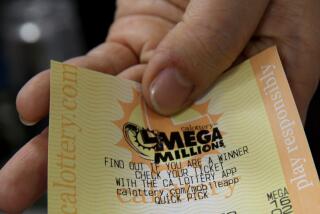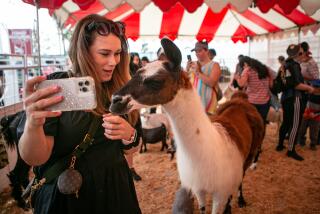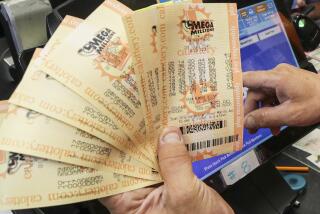New Games Appear to Be Paying Off for State Lottery : Marketing: Figures show a steady increase in betting in past four months, 7% ahead of the same period in â91.
SACRAMENTO â A new marketing strategy that called for a major expansion of its game network appears to be paying off for the California Lottery, which released financial reports Wednesday showing a steady increase in betting for the past four months.
Lottery Director Sharon Sharp said revenues for that period are $40 million, or 7%, ahead of the same period last year, a statistic that she interpreted as a clear signal that players are responding positively to the wide variety of new games that have been introduced during the year. Total four-month sales to date are $580 million.
âThereâs a good feeling around here again,â she said.
Sharp was appointed lottery director by Gov. Pete Wilson just over a year ago with the understanding that her prime task was to reignite player interest in the games of chance and stop a decline in revenues. Sales had begun a long, slow decline two years earlier that did not bottom out until midsummer of this year. Each yearâs decline meant less money for education, which receives the biggest share of lottery earnings.
Within weeks of her appointment, Sharp announced an aggressive marketing strategy that required the lottery to introduce an array of new games, including several that had never been played in California. In quick succession the lottery introduced Fantasy Five, a version of Lotto that uses fewer numbers and has better odds; a daily numbers game, and this week Keno, a Nevada-style game that can be played every five minutes.
During this same period, the lottery doubled, tripled and then quadrupled the number of instant games, called Scratchers, offered to the public.
Sharp acknowledged that some of the increase in sales has to be attributed to the luck of the jackpot. In late summer the lottery had a series of big Lotto jackpots that attracted a large number of players and heavy sales. Lotto, one of the oldest lottery games, is still its mainstay, accounting for 62% of total sales.
And though Fantasy Five and the daily numbers game produced initial excitement among players, sales of both games have declined in the past four months. For most of the first half of the year, Fantasy Five averaged sales of $2.9 million a week, but for four months its average has been $1.9 million. Likewise, the daily numbers game averaged $1.6 million in weekly sales immediately following its introduction in April, but in recent months it has averaged only $1.28 million.
An encouraging sign, however, has been the performance of the Scratcher games, which last year had weekly sales averaging $5.4 million but since July have had sales averaging $7.6 million. Scratchers provide about 25% of the lotteryâs total revenues and together with Lotto more than made up for the declines in other games.
Sharp said she is expecting Keno to be a major new moneymaker for the lottery. The game debuted to successful sales on Monday but on Tuesday was marred by a computer failure that forced a 10-hour suspension in sales.
The lotteryâs aggressive new marketing strategy, despite its successes, has prompted criticism from its opponents, who continue to complain that the state shouldnât be in the business of encouraging people to gamble.
âI think itâs demeaning for the state to be out there persuading people to buy a product where most of the customers lose,â said the Rev. Harvey Chinn, a Methodist minister and lobbyist for the California Council on Alcohol Problems.


